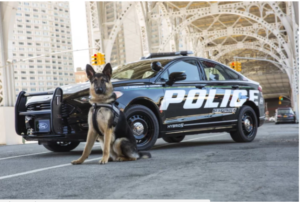In my novel Acceptable Misconduct, the main character, Isabel, gets pulled over by a police officer for an unknown infraction. Anxiety-ridden, she tries to figure out how to handle it and what to say.
When a police officer pulls you over while you’re driving, you may be too nervous to think about what the officer can legally obligate you to do, or whether he/she can search your car or your person. You may consent to search requests without realizing that you are under no legal obligation to do so.
I’m not here to tell you not to comply with a police officer’s request. I am here to tell you what the officer can legally do, so that you know your rights. You can decide for yourself if you want to consent to additional searches.
*****
What is the legal basis for an auto stop?
First, the Fourth Amendment of the U.S. Constitution indicates: “The right of the people to be secure in their persons, houses, papers, and effects, against unreasonable searches and seizures, shall not be violated, and no Warrants shall issue, but upon probable cause, supported by Oath or affirmation, and particularly describing the place to be searched, and the persons or things to be seized.”
The Fourth Amendment provides minimum constitutional protections regarding searches. Be advised that some states provide even further protections, beyond those that the Constitution provides, so research the laws in your state.
Second, what is probable cause? There is an enormous amount of case precedent on this, way too much to include here. Today I want to specifically address your rights during a traffic stop.
Wait, you think, don’t police need probable cause to pull you over in a traffic stop? Nope.
*****
Stop and frisk
It all started with Terry v. Ohio. As you know, I love history so here goes. The year was 1968. A police officer noticed two apparently suspicious-looking men continuously looking into a store (about 24 times). The men paced back and forth and stopped to talk around a street corner. They appeared to be casing the store in anticipation of robbing it. A police officer stopped them, patted them down, located a firearm on one of the suspects, and arrested him for illegal possession of a firearm.
Note that here the officer stopped and searched them for one potential crime (robbery) and ended up charging them with a different crime (gun possession) that he didn’t originally suspect them of.
The Defendant Terry argued that the officer could not stop and search him without probable cause, and that he did not have probable cause in this case.
The Supreme Court ended up creating a new constitutional test that applies to officers doing a limited search of a suspect’s outer clothing. Thus, stop and frisk was born.
Stop and frisk applies to situations such as in Terry, and also applies to traffic stops, which is important because almost everyone has been stopped while driving. For the record, I’ve been stopped only one time driving, and I was driving my mother’s car and the state inspection sticker was past due. Thanks, Mom! I know. I’m a goody two-shoes and I’m boring. I prefer to stay at home at night and watch dig ‘em up shows and read Patricia Cornwell than be out popping wheelies and hitting mailboxes or whatever you kids are doing these days. If it involves me leaving my sofa and/or making small talk >>> NOT interested.
According to the Court, when the officer approached the suspects, he had reason to believe that they were planning an armed robbery, and thus had reason to believe they were armed. The frisk was seen as protecting the officer’s safety.
Under this test, an officer can stop and frisk a suspect if the officer has reasonable suspicion (a lesser standard than probable cause) that the suspect has committed, will commit or is committing a crime. Would a reasonably prudent officer draw inferences on his or her experience that the suspect is armed and dangerous? If YES, the officer is entitled to do a limited search of the outer clothing. This is the frisk/pat down. Note that the only thing an officer can remove from your pockets or your person upon doing the frisk is something that could be a weapon.
In Terry, the Court held that the officer had reasonable suspicion that the suspects were planning a crime because of their behavior, and this led to the reasonable inference that they were armed.
For what it’s worth, my Criminal Procedure professor had this to say: If a cop says he was there, looked at the person and reasonably suspected that the suspect was armed and dangerous, and found a gun on the person, no court ever will find that that particular stop and frisk was not reasonable. Criminal defense attorneys, would you agree with this?
In sum, under Terry an officer who makes a legal stop can do a protective frisk of the suspect if the officer has reasonable suspicion that the suspect is armed and dangerous. This also applies to auto stops.
Got that? OK.
*****
What happens when an officer stops your vehicle?
First, the officer has the right to order everyone out of the vehicle. This is for his own safety. They don’t always do this, but they have the right to.
Second, he has stopped you because he (apparently) has 1) probable cause that you have committed or are committing a crime, or 2) reasonable suspicion that you have committed, are committing, or will commit a crime.
If you’ve committed an infraction, such as failure to signal when changing lanes, running a red light, speeding, etc., that is probable cause for a stop. Technically the officer can arrest you. They usually don’t for such minor stuff, but theoretically they could if they have probable cause to do so.
Why might an officer arrest you? Because he gets a free search. This is NOT a frisk. This is a search incident to arrest, and is MORE than a frisk. The officer gets to search your entire person, and remove things from your pockets even if it’s not clear that they are weapons. He doesn’t have to show probability that the arrestee has weapons or anything like that. It’s an automatic right to search when he arrests someone.
If an officer arrests someone pursuant to an auto stop, he can search the person’s body and the passenger compartment (the so-called “grab area”) of the car only if the arrestee is within reaching distance of the passenger compartment at the time of search or it is reasonable to believe the car contains evidence of the offense of the arrest. The reason the officer can search the grab area is for his own safety, in case the arrestee grabs a weapon to use against him.
If those justifications are absent, then police need a warrant or another exception to search the car. Also remember that the officer can seize anything in plain view.
What does this mean? When an officer stops your vehicle under probable cause and arrests you, he does not have the right to search the trunk of your vehicle incident to arrest (because it’s not part of the grab area). He can only search the trunk if 1) he has a warrant to search the trunk, 2) he has probable cause to think that the trunk contains evidence of a crime, 3) another exception exists, such as exigent circumstances or plain view, or 4) you give him consent to search the trunk.
Remember: he arrests you pursuant to a vehicle stop, and he can search your entire person AND the grab area of the vehicle.
If he stops your vehicle under reasonable suspicion, he can do a limited frisk of your person, as described above, and can also seize anything in plain view. If, in the course of doing a limited frisk, he finds something on you that gives him probable cause, then he can do a more extensive search of your person AND he can arrest you. If he finds something incriminating on your person, this may give him probable cause to search your entire vehicle, including the trunk.
Have you ever watched the show Cops and seen officers who, after stopping someone’s vehicle (but not arresting them), say something like, “You don’t mind if I search your car, do you?” If the officer has the right to search your car, he will not ask permission. He will do it. If he asks permission, he does not have the right to search under the circumstances. This means that you are not required to consent to the search. If he asks for consent, and you explicitly say no, and he searches your vehicle, it’s an illegal search and he can’t use what he finds in the vehicle against you.
One more thing. You’ve heard it on Law & Order: Fruit of the poisonous tree. If an officer conducts a search he is not allowed to do (e.g. pulls you over, arrests you and searches your trunk without probable cause or a warrant), everything he finds in the trunk is tainted, i.e. fruit of the poisonous tree. If one step done by the officer is not permissible, then everything he finds after that is tainted and cannot be used against you.
Why am I telling you all this? Because I want you to be informed and to know your rights. You attorneys who practice criminal defense, if you disagree with anything, please let me know!
Happy driving!
Questions? Email me at maria@lawschoolheretic.com
Get helpful writing tips and more
in your inbox
Join the tribe and get free fiction and self-publishing tips.
Thank you for subscribing.
Something went wrong.


Be First to Comment